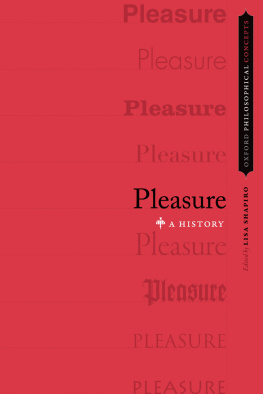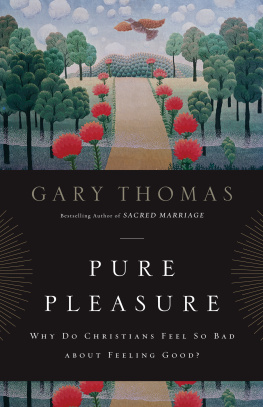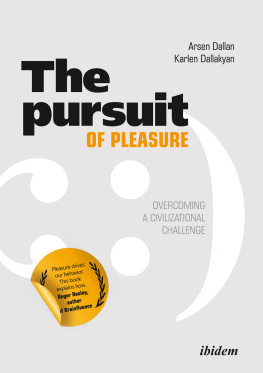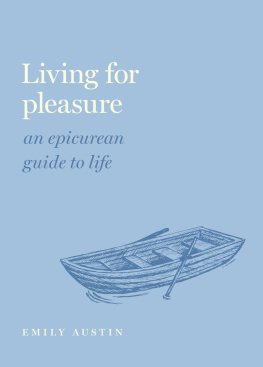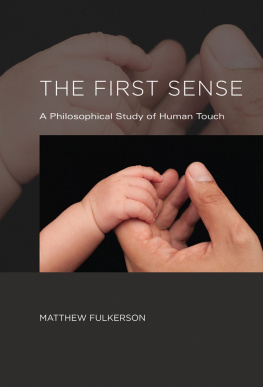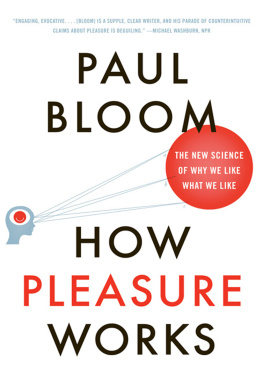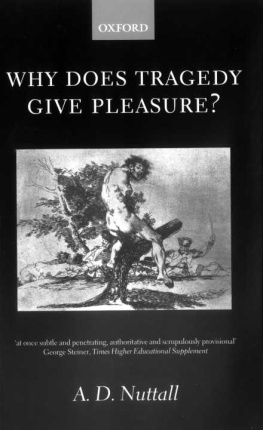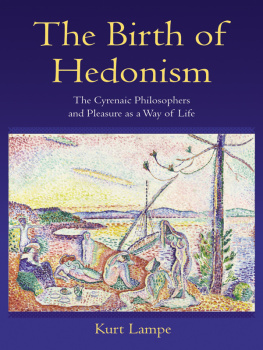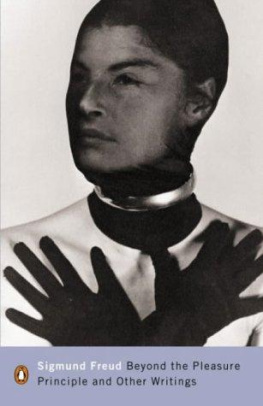Pleasure

OXFORD PHILOSOPHICAL CONCEPTS
Christia Mercer, Columbia University
Series Editor
PUBLISHED IN THE OXFORD PHILOSOPHICAL CONCEPTS SERIES
Efficient Causation
Edited by Tad Schmaltz
Sympathy
Edited by Eric Schliesser
The Faculties
Edited by Dominik Perler
Memory
Edited by Dmitri Nikulin
Moral Motivation
Edited by Iakovos Vasiliou
Eternity
Edited by Yitzhak Y. Melamed
Self-Knowledge
Edited by Ursula Renz
Embodiment
Edited by Justin E. H. Smith
Dignity
Edited by Remy Debes
Pleasure
Edited by Lisa Shapiro
FORTHCOMING IN THE OXFORD PHILOSOPHICAL CONCEPTS SERIES
Persons
Edited by Antonia LoLordo
Evil
Edited by Andrew Chignell
Health
Edited by Peter Adamson
Space
Edited by Andrew Janiak
Teleology
Edited by Jeffrey K. McDonough
Love
Edited by Ryan Hanley
Human
Edited by Karolina Hbner
Animals
Edited by G. Fay Edwards and Peter Adamson
The World-Soul
Edited by James Wilberding

Oxford University Press is a department of the University of Oxford. It furthers the Universitys objective of excellence in research, scholarship, and education by publishing worldwide. Oxford is a registered trade mark of Oxford University Press in the UK and certain other countries.
Published in the United States of America by Oxford University Press
198 Madison Avenue, New York, NY 10016, United States of America.
Oxford University Press 2018
All rights reserved. No part of this publication may be reproduced, stored in a retrieval system, or transmitted, in any form or by any means, without the prior permission in writing of Oxford University Press, or as expressly permitted by law, by license, or under terms agreed with the appropriate reproduction rights organization. Inquiries concerning reproduction outside the scope of the above should be sent to the Rights Department, Oxford University Press, at the address above.
You must not circulate this work in any other form and you must impose this same condition on any acquirer.
Library of Congress Cataloging-in-Publication Data
Names: Shapiro, Lisa, editor.
Title: Pleasure : a history / edited by Lisa Shapiro.
Description: New York : Oxford University Press, 2018. | Series: Oxford handbooks | Includes bibliographical references and index.
Identifiers: LCCN 2017047686 (print) | LCCN 2018008898 (ebook) | ISBN 9780190225131 (online course) | ISBN 9780190225124 (updf) | ISBN 9780190882495 (epub) | ISBN 9780190225117 (pbk. : alk. paper) | ISBN 9780190225100 (cloth : alk. paper)
Subjects: LCSH: Pleasure.
Classification: LCC B105.H36 (ebook) | LCC B105.H36 P54 2018 (print) | DDC 128/.4dc23
LC record available at https://lccn.loc.gov/2017047686
Contents
Lisa Shapiro
Emily Fletcher
Matthew Strohl
Sajjad Rizvi
Susanna Berger
Martin Pickav
Lisa Shapiro
Melissa Frankel
Keren Gorodeisky
Roger Mathew Grant
Dominique Kuenzle
Ann M. Kring and Amy H. Sanchez
Murat Aydede
PLATES
FIGURES
Oxford Philosophical Concepts (OPC) offers an innovative approach to philosophys past and its relation to other disciplines. As a series, it is unique in exploring the transformations of central philosophical concepts from their ancient sources to their modern use.
OPC has several goals: to make it easier for historians to contextualize key concepts in the history of philosophy, to render that history accessible to a wide audience, and to enliven contemporary discussions by displaying the rich and varied sources of philosophical concepts still in use today. The means to these goals are simple enough: eminent scholars come together to rethink a central concept in philosophys past. The point of this rethinking is not to offer a broad overview, but to identify problems the concept was originally supposed to solve and investigate how approaches to them shifted over time, sometimes radically. Recent scholarship has made evident the benefits of reexamining the standard narratives about western philosophy. OPCs editors look beyond the canon and explore their concepts over a wide philosophical landscape. Each volume traces a notion from its inception as a solution to specific problems through its historical transformations to its modern use, all the while acknowledging its historical context. Each OPC volume is a history of its concept in that it tells a story about changing solutions to its well-defined problem. Many editors have found it appropriate to include long-ignored writings drawn from the Islamic and Jewish traditions and the philosophical contributions of women. Volumes also explore ideas drawn from Buddhist, Chinese, Indian, and other philosophical cultures when doing so adds an especially helpful new perspective. By combining scholarly innovation with focused and astute analysis, OPC encourages a deeper understanding of our philosophical past and present.
One of the most innovative features of OPC is its recognition that philosophy bears a rich relation to art, music, literature, religion, science, and other cultural practices. The series speaks to the need for informed interdisciplinary exchanges. Its editors assume that the most difficult and profound philosophical ideas can be made comprehensible to a large audience and that materials not strictly philosophical often bear a significant relevance to philosophy. To this end, each OPC volume includes Reflections. These are short stand-alone essays written by specialists in art, music, literature, theology, science, or cultural studies that reflect on the concept from their own disciplinary perspectives. The goal of these essays is to enliven, enrich, and exemplify the volumes concept and reconsider the boundary between philosophical and extraphilosophical materials. OPCs Reflections display the benefits of using philosophical concepts and distinctions in areas that are not strictly philosophical, and encourage philosophers to move beyond the borders of their discipline as presently conceived.
The volumes of OPC arrive at an auspicious moment. Many philosophers are keen to invigorate the discipline. OPC aims to provoke philosophical imaginations by uncovering the brilliant twists and unforeseen turns of philosophys past.
Christia Mercer
Gustave M. Berne Professor of Philosophy
Columbia University in the City of New York
Aristotle
NE Nicomachean Ethics. Translations are based on Aristotle: Nicomachean Ethics, translated with commentary by T. H. Irwin (Indianapolis: Hackett, 1999), and have sometimes been modified.
Avicenna
DA Avicennas De Anima, Being the Psychological Part of Kitb al-Shif. Edited by F. Rahman. London: Oxford University Press, 1959.
Thomas Aquinas
ST Summa Theologiae. In Opera omnia. Editio Leonina. Rome: Commissio Leonina, 18881906.
George Berkeley

